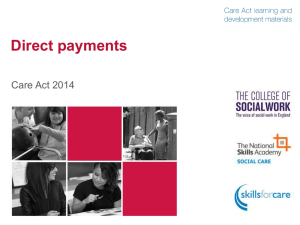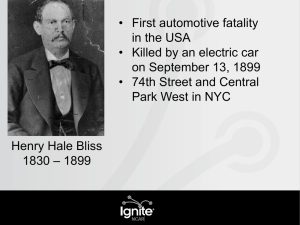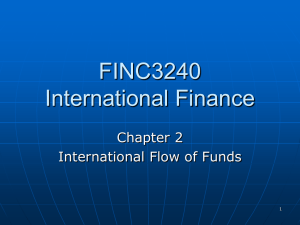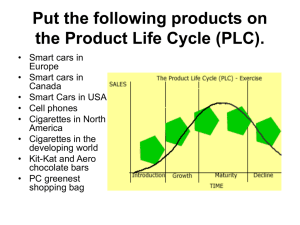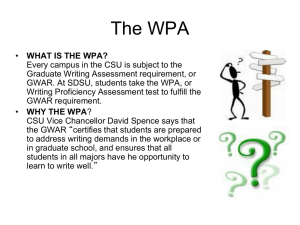Tom Dishman of Streetline - Wisconsin Parking Association
advertisement
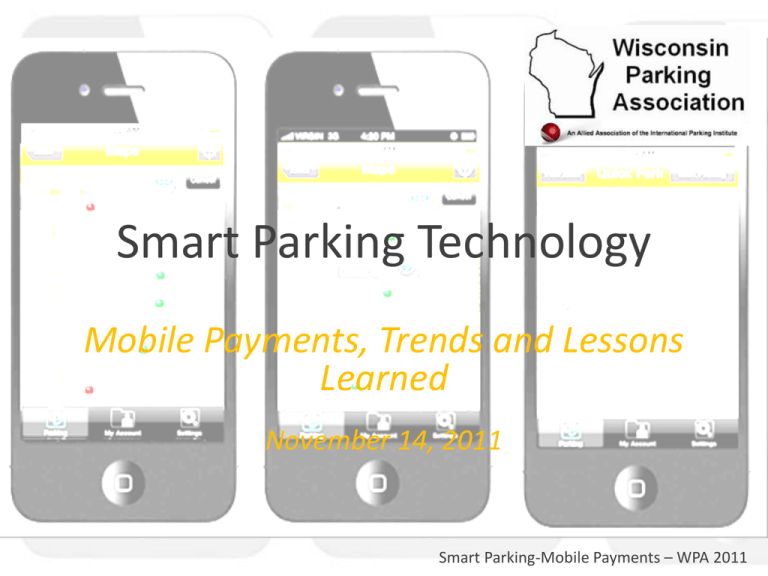
Smart Parking Technology Mobile Payments, Trends and Lessons Learned November 14, 2011 Smart Parking-Mobile Payments – WPA 2011 Agenda What Is Mobile Payment Technology? How Does It Work? Where Is It Available? The Eco System: Who Are The Providers? Business Case: Washington, DC Lessons Learned Mobile Apps, The Sweet Spot Of Convenience Where Is The Market Heading? Smart Parking-Mobile Payments – WPA 2011 What is mobile payment technology? Mobile payment technology is a means to initiate short-term parking with a mobile phone. Many times referred to as Pay by Cell/Phone. Works traditionally for non-gated environments: curbside/on-street spaces, surface lots and garages One-time registration of license plate number, credit card and cell phone number via internet, mobile app or help desk Payments separated by location (zone) and available per transaction or via “virtual/mobile wallet” System Accessibility: Interactive Voice Response (IVR), Dual Tone Multi Frequency (DTMF) SMS/TXT message Landline Native mobile applications (iPhone, Android, BlackBerry, Windows Mobile 7) Helpdesk Quick Response (QR) Code, Near Field Communication (NFC) Smart Parking-Mobile Payments – WPA 2011 How does it work? Customer pulls up to an available parking space Customer looks for pay by phone signage (adhesive signs on meter of metal signs on poles / multispace meters / block face Signage contains a zone number reflecting Parking Provider’s zone and rate structure Customer enters zone number and typically parking duration into preferred user interface: IVR, mobile app, SMS/TXT message, etc… Customer receives parking confirmation and alerts 15 minutes prior to parking expiration Parking revenue and convenience fee authorized real-time and settled with merchant processor via end of day batch Smart Parking-Mobile Payments – WPA 2011 Where is pay by phone parking available? Pay by phone parking is available in more than 420 locations in 26 states Smart Parking-Mobile Payments – WPA 2011 The Eco System: Who are the providers? Smart Parking-Mobile Payments – WPA 2011 Business case: Washington, DC Smart Parking-Mobile Payments – WPA 2011 Business case: Washington, DC 17,157 curbside spaces operational Smart Parking-Mobile Payments – WPA 2011 Business case: Washington, DC Currently exceeding 9,000 transactions per day. Mobile app usage exceeds 56% of these daily transactions Transactions: June 2011: 18,210 July 2011: 69,604 August 2011: 125,013 September 2011: 173,716 October 2011: 199,789 Users: June 2011: 18,591 July 2011: 41,271 August 2011: 71,696 October 2011: 131,025 September 2011: 101,905 Smart Parking-Mobile Payments – WPA 2011 Business case: Washington, DC Smart Parking-Mobile Payments – WPA 2011 Business case: Washington, DC Smart Parking-Mobile Payments – WPA 2011 Business case: Washington, DC Smart Parking-Mobile Payments – WPA 2011 Lessons Learned for mobile payment technology Lessons learned Draft a joint implementation plan with all stakeholders (marketing, enforcement!) and stick to it Make sure all stakeholders are committed to timeline Train the PEO’s how to prevent erroneous citations – if not managed well this will hurt the program Vendors and Parking Authorities’ partnerships in the social media arena are driving positive dialogues Stay on top of your social media – if you do you will keep people engaged and they will feel part of the success Set up programs with local business districts to increase awareness and create local commitment Listen to user feed back and create a User Focused Project Plan to enhance features and service Smart Parking-Mobile Payments – WPA 2011 Mobile apps: the sweet spot of convenience Mobile apps Smart Parking-Mobile Payments – WPA 2011 Mobile apps: the sweet spot of convenience Mobile apps Smart Parking-Mobile Payments – WPA 2011 Where is the market heading? Technology shift Shift from traditional payment methods to mobile apps, QR code and NFC (‘Tap & Go’) Mobile payment revolution – riding the wave Extension of mobile payments to every aspect in life (open loop system) and eventually elimination of cash Available parking guidance focus Real-time available aggregated data enables reduction of congestion & Co2 emissions plus TDM Location based marketing / customer loyalty programs Customers can benefit from localized and targeted marketing, e.g. buy a coffee at Starbucks when parked nearby and get a free scone (opt-in only and customizable profile for selective and relevant approach) Smart Parking-Mobile Payments – WPA 2011 Any questions? Smart Parking-Mobile Payments – WPA 2011
